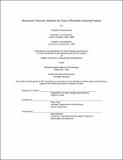Structured financial solutions for green affordable housing projects
Author(s)
Subramanian, Shwetha
DownloadFull printable version (647.0Kb)
Other Contributors
Massachusetts Institute of Technology. Dept. of Urban Studies and Planning.
Advisor
Peter Roth.
Terms of use
Metadata
Show full item recordAbstract
Environmentally responsible buildings are increasing gaining recognition in the building industry because they address objectives such as conserving natural resources, improving energy efficiency and indoor air quality and they make more economic sense. Affordable housing and Green buildings in particular combine well together as the goals of both overlap. A joint team comprising of New Ecology Initiatives, the Tellus Institute, LISC Boston and the Green CDC's Initiative is currently investigating the Costs and Benefits of Green Affordable Housing. This thesis builds on the research in progress, by focusing on the financial challenges and opportunities faced by green affordable housing. In an attempt to incentivize green affordable housing, this thesis investigates the capital sources that are available at key stages of the development process and how they can best be allocated to meet the costs and needs that arise at each developmental stage. Specifically, the fiscal sources utilized on two representative projects- one rental project and one homeownership project, were analyzed and solutions were found to restructure these resources to pay for green premiums. Several viable solutions emerged to offset the incremental costs of greening in the early phases of the two projects. (cont.) But the most significant finding of this thesis was the opportunity for cost savings and enhancement of economic value of Green Affordable housing by capitalizing savings from lowered operating costs. This is a powerful mechanism that has the ability to service more debt on the project and cover costs incurred during the interim stages. This thesis demonstrates that there are several ways of structuring successful financing solutions to meet the objectives of all the participants involved, thereby making Green Affordable housing a financially sustainable proposition.
Description
Thesis (S.M.)--Massachusetts Institute of Technology, Dept. of Urban Studies and Planning, 2005. This electronic version was submitted by the student author. The certified thesis is available in the Institute Archives and Special Collections. Includes bibliographical references (p. 63).
Date issued
2005Department
Massachusetts Institute of Technology. Department of Urban Studies and PlanningPublisher
Massachusetts Institute of Technology
Keywords
Urban Studies and Planning.